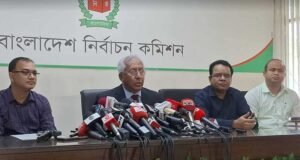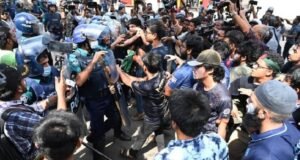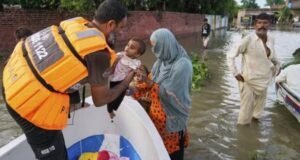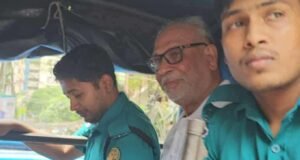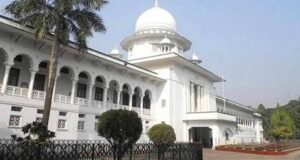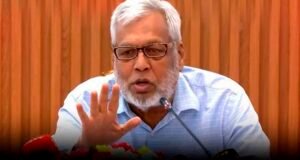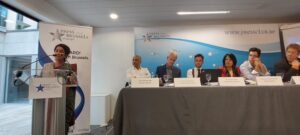
Bangla Mirror Desk:
Brussels, 23 June 2024: Speakers at an international conference on the ‘Rise of fundamentalism:
Implications, challenges and threats’ held at the European Press Club in Brussels on 23 June said,
fundamentalists are that section of the population that aggressively attempts to make religious
dictums mandatory by virtue of religious majority population. Sane people everywhere must raise
their strong voices against any form of extremism, specially religious ones, since they are very
sensitive and can flare up very quickly. These type of fundamentalist radicalism has brought about
various atrocities including genocides around the world in the past and also in recent years.
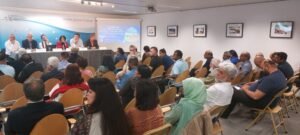
The conference was organized by the Europe-based Bengali diaspora organisation, European
Bangladesh Forum (EBF) in collaboration with the Belgium-based human rights organisation, Global
Solidarity for Peace and Switzerland-based International Human Rights Commission Bangladesh.
Chaired by Ansar Ahmed Ullah, President of EBF-UK, the conference was addressed among others by
Harry van Bommel, former Member of the Dutch Parliament, Niels van den Berge, former Member
of the Dutch Parliament, Professor Dr. Tazeen Murshid, Director, Development Research
Cooperation, Brussels, Dr Tommaso Virgili, Postdoctoral Research Fellow at the WZB Berlin Social
Science Center, Germany, Chris Blackburn, British Political Analyst, UK & recipient of ‘Friend of
Bangladesh’ award, Andy Vermaut, President of the World Council for Public Diplomacy and
Community Dialogue and EU Climate Pact Ambassador, Belgium, Preeti Rahman, Deputy Head of
Bangladesh Mission in Belgium, Pradip Kumar Dutta, Columnist and human rights activist from
Aamra Ekattor, Bangladesh, M M Murshed, President of Global Solidarity for Peace, Belgium, Khalilur
Rahman Mamun, President of International Human Rights Commission Bangladesh, Switzerland,
Jahangir Chowdhury Ratan, General Secretary of Belgium Awami League and Bikash Chowdhury,
President, EBF, Netherlands. Tanim Chowdhury gave the opening speech.
The speakers said, charities in Europe and North America are being abused by radical Islamist
political movements abroad. These connections they said, raise significant concerns about the use of
charitable fronts to further radical ideologies and support militant activities. The ongoing
investigations and revelations highlight the need for greater scrutiny and accountability for
organisations with potential links to extremist groups. In Bangladesh and elsewhere we find a
tendency by some quarters to show the rise of religious fundamentalism as non-significant. But in
real terms it is growing alarmingly fast. There is no reason to put it under the carpet, rather should
be faced and done away with upfront, they continued.
In his paper veteran Dutch Member of the Parliament Harry van Bommel suggested that the
European Union and the United States should put more pressure on the government of Pakistan to
ensure that the educational system is based on human rights and basic freedoms. Pakistan needs
the free world for various reasons. The world would be a better place with a free and democratic
Pakistan, he continued. Referring to the rise of extreme religious fundamentalism the veteran Dutch
politician who was for nearly 20 years an MP in the Dutch parliament said, developments that let to
the 9/11 attacks can not be understood by solely looking at Al-Qaeda and the Taliban in Afghanistan.
The rise of Islamic fundamentalism in Pakistan is an important root cause in this respect, he added.
Addressing the conference Chris Blackburn said, Jamaat e Islami has powerful allies, funded and
aided by the Pakistani Inter-Services Intelligence (ISI) and were once patronised by the Gulf States,
notably Saudi Arabia. These funds, he added, have fueled their Dawah activities, including public
relations with Western academics, diplomats, and politicians who have been misled by Jamaat’s
duplicity. This has had a devastating effect on social cohesion and security policy in Europe and
North America.
European academics, researchers, human rights activists from other civil society organisations and
members of the Bangladesh community in different European countries including UK, Belgium,
Netherlands, Switzerland, Germany participated in the programme.
 Weekly Bangla Mirror | Bangla Mirror, Bangladeshi news in UK, bangla mirror news
Weekly Bangla Mirror | Bangla Mirror, Bangladeshi news in UK, bangla mirror news


